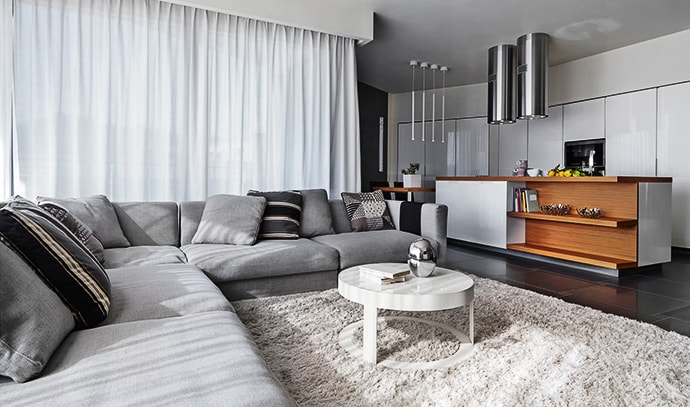Open plan layouts, lightweight construction, noisy electronics, entertainment equipment, and the general outdoors. The combination of all these elements is a noisy home. The continuous incoming sounds from all sides can be insufferable at times. It gets worse if you live in an apartment or condo complex.
Thankfully, you don’t need to move or find a way to build a house of thick bricks to reduce this noise. The advent of technology and some soundproofing experts have made it easier for people to give their ears some sort of relief.
There are a number of various ways you can lessen the number of decibels that invade your hearing. Whether you use one or all, you will be essentially doing two things:
- Noise Control
The first action you’ll be taking is controlling the noise. This includes removing noisemakers and inhibiting the movement of sound waves. For instance, removing heavy machinery and fixing squeaky floorboards.
- Soundproofing
This is a supplement strategy to noise control for optimal results. Soundproofing is basically you using materials that absorb sound vibrations. For example, rubber and foam are two commonly used materials to soundproof a room as they minimize the transference of sound waves.
But How Do You Do It?
Here are some ways you can actually soundproof your home:
Soundproofing Materials
The main idea behind using soundproof materials is to cover the surfaces with soft materials. Unlike hard surfaces, soft materials absorb the sound waves instead of reflecting them. This immediately reduces noise significantly.
Flooring
If you want to reduce the amount of sound bouncing around your home, opt for padded carpeting instead of hardwood, tile or laminate flooring.
Windows
For windows, you can really just remove the glass panes. Instead of that, you can use soundproof curtains. They are quite inexpensive but only make a marginal difference in the level of noise. You need to supplement these with other soundproofing tactics.
Vinyl printers
Ceiling
After the walls and flooring, the ceiling has the largest empty surface area for sound waves to bounce around. Companies like soundproofliving.com provide services where they use acoustic sound-proofing material to cut down noise.
Walls
Walls are the hardest to soundproof in a home since you can’t really put acoustic panels in your living space. However, you can try using decorative items to your advantage. But if you have a home cinema or a studio, you can use acoustic panels or soundproofing tiles on the walls as well.
Using Doors
Besides windows, doors are the largest points of entry for noise in any room. Just simply keeping the door close may reduce a significant amount of noise. However, you can further increase efficiency.
If it’s in the budget, you can try replacing flimsy thin doors with sold thick ones, especially the front and backdoors. This is one of the easiest ways you can reduce noise and soundproof a room.
Most doors, especially interior doors have a hollow core. They have a honeycomb construction that’s filled with air. As you would imagine, this doesn’t necessarily keep sound out. According to the Window and Door Manufacturers Association, particleboard and composite core doors along with solid wood doors work much better.
Weather-stripping Doors
Despite using a sold door and keeping it close, noise still manages to sneak in. The gaps above, below, and on the sides of the door allow sound waves to pass through.
To make doors even more efficient in blocking noise, opt for weather-stripping them or using door soundproofing around the door jamb to seal them.
One of the most popularly used materials for weather-stripping doors is adhesive-backed high-density foam tape. These self-adhesive soundproofing tapes come in 17-foot long rolls. You need at least one roll for one door but this can vary depending on the size and shape of your door.
Besides the tape, rubber bulb weather-stripping gaskets made of vinyl, cushion-vinyl strips, and felt stripping are also used. Just like the tape, they seal the jambs and close the gaps beneath and around the doors to minimize noise.
The Garage Door
In most homes, garage doors have an open interior framework and simple sheet facing. This facing is usually made of steel, vinyl, aluminum or plywood. All of these materials on their own don’t do much for keeping the noise out.
If you have a bedroom next to or above the garage, the street noise will travel right into your house. The solution for this is getting a sound-minimizing door. There are manufacturers that make foam-insulated garage doors that keep sound out effectively.
Fixing Flooring
Squeaky floors don’t necessarily present as big of a problem as hollow doors. When nobody’s walking on the squeaky floors, it’s not really a problem for anyone. But when everyone is at home and walking around the house, it can get pretty annoying.
Additionally, it can be a sign of a loose floorboard, which can be dangerous and a hazard for tripping. If you’re handy and know what you’re doing, get fixing those floors or stairs. However, if it’s not something you are a master in, you can get a contractor to do the job for you.
Fixing the Noisy Plumbing
Dripping water and the rattle and banging of loud pipes can be very annoying. If you hear chattering in the pipes each time you turn on a faucet or flush the toilet, it’s time to get the pipes checked.
If the noise is coming from the water coming to halt at the end of the pipes, a water hammer arrestor can help. It provides an air cushion so that the water can pass through the end of the pipe without making a loud banging noise.
Other than that, old plumbing and rusty pipes also tend to be quite noisy. Get a plumber to give your system a check if your taps keep dripping water despite being turned off or your pipes sound like they might break.
Cut Down Noisemakers
This doesn’t mean being quiet or sending your kids and pets outside to play. This refers to cutting down on noise by using quieter appliances.
If you can afford it, switch out your old appliances for more recent models that are designed to produce less noise. Appliances like dishwashers, washing machines, fans, and HVAC systems are the noisy ones. Manufacturers now offer quieter counterparts that can reduce the noise significantly.





